Women Igniting Change®
In a post pandemic world, employees are demanding that their leaders do more than just lead the business. They are looking for their companies to provide a culture of purpose and possibility, navigate changing societal expectations and build a sense of community and belonging. Leaders need to elevate and engage their people by connecting personal values with those of the entire organization, and at the same time inspire collaboration, innovation and results. Robbin Jorgensen, Founder and CEO of Women Igniting Change®, is your host. A former corporate executive who has worked with women leaders in 31 countries on 6 continents, she believes that unleashing the contribution of women is one of the key drivers to moving business and humanity forward. Join Robbin every Monday as she dives into the intersection of business results, women’s leadership and social responsibility. She’ll share interviews with decision makers, provide tangible strategies, highlight women change makers and more as she inspires you to take action…for yourself, your organization and our world.
Episodes
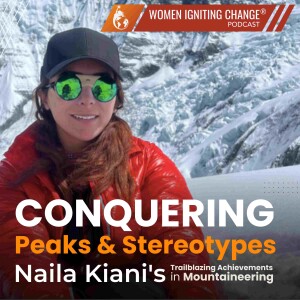
Monday Mar 04, 2024
Monday Mar 04, 2024
“For me, the achievement is experiencing the journey,” says Naila Kiani, who in just a few short years has become the first Pakistani woman climber to summit ten peaks above 8,000 meters, and the only Pakistani person to ascend seven peaks above 8,000 meters in six months. In that brief span of time, she has experienced both the zenith and the nadir–witnessing great tragedy and being—almost literally—over the moon. Though she started her journey simply to fulfill a personal ambition and act as a role model to her daughters, showing them that they could do anything, she soon became an inspiration to many–particularly to women.
Naila, like many women of her background, grew up feeling restricted. Like many parents, once she had children, she was expected to give up adventuring in order to provide and sacrifice for her family. Yet, as notice of her climbing grew, she began to receive more and more messages from people in Pakistan and throughout the world saying that she had inspired them to follow their own passions and to break barriers. Despite receiving her fair share of criticism from people who doubted the legitimacy of her achievements, she has kept moving forward with determination. Such a sense of mental toughness, which she says is even more important to climbing than physical toughness, was forged at an early age.
On today’s episode of Women Igniting Change, Naila explains how mountaineering has fundamentally changed her approach to life.
Quotes
“My friends were telling me, ‘Why are you climbing it? What if you don’t reach the top? It’s not an achievement. Why don’t you climb a 7,000 meter peak, reach the top, raise the country’s flag, that will be an achievement. I disagreed because for me, achievement was actually experiencing the journey.” (2:53 | Naila)
“Even when I started this, I was already mentally super strong, because I had a tough life, a really, really tough life growing up. I had a very difficult childhood, I had a very, very difficult university life. My early adulthood years were quite tough. I went through that, and I think I’m a strong person because of my challenging life.” (6:08 | Naila)
“I wanted to inspire my daughters. I had a very restrictive life, I’m from a very conservative family, or I was. I want my daughters to grow up with the mindset that they can do anything that they want to do. I want to be their role model.” (9:23 | Naila)
“When I first started mountaineering, climbing, it was just for me and my daughters. It was a personal reason why I was climbing. But I started getting messages from a lot of females, mostly from Pakistan, but also from outside of Pakistan, and a lot of men, too. They thought it was incredible that a married woman with two very young children, a full-time working professional, was climbing high peaks. And they were very inspired because I was not from the mountains.” (9:45 | Naila)
“Why should I give up just because of someone’s perspective or someone’s perception? So, I continued.” (14:51 | Naila)
“Before, adventure was really not associated with, not just married women but even married men. Eventually they stop doing adventurous activities after having kids, because you now have to be responsible for your family and sacrifice for your family. I love my children, but I think after seeing my journey a lot of women especially tell me they’ve started to do whatever they were always passionate about.” (16:59 | Naila)
“I could be judgmental. Not in a negative way, I would never go and tell somebody, ‘You shouldn’t do this or that, but deep down, I used to judge people. But being in the mountains, I was very close to death, I saw people dying. I think that helped me to be a non-judgmental person.” (20:22 | Naila)
Links
Connect with Naila Kiani:
Instagram: https://www.instagram.com/naila._.kiani/?hl=en
Facebook: https://www.facebook.com/nailakianik2/
LinkedIn: https://www.linkedin.com/in/nailakiani
Wikipedia: https://en.wikipedia.org/wiki/Naila_Kiani
Connect with Robbin Jorgensen (She/Her):
Website: https://womenignitingchange.com
LinkedIn: https://www.linkedin.com/company/women-igniting-change/
LinkedIn: https://www.linkedin.com/in/robbinjorgensen/
Facebook: https://www.facebook.com/robbin.jorgensen/
Podcast production and show notes provided by HiveCast.fm
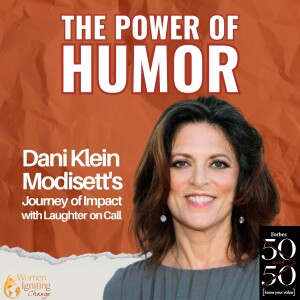
Monday Feb 26, 2024
Monday Feb 26, 2024
“Using laughter to create human connection, that’s always been my game,” says Dani Klein Modisett, founder and CEO of Laughter on Call, a company which runs interactive workshops in workplaces and caregiving communities to foster connection and relieve stress through the power of humor and laughter.
The idea for this company was born when Dani’s mother, who was battling Alzheimer’s disease, was having trouble adjusting to her new surroundings in a memory care facility. Dani hired a comedian to cheer her mother up. She observed how the comedian's warm, interactive humor, which Dani terms 'affiliative humor,' not only uplifted her mother but also helped her integrate into her new surroundings.
Needless to say, building trust, and learning to be vulnerable and to make mistakes are invaluable to building strong relationships in the corporate setting. This is particularly true when many companies are international, and most people work at least partially from home. Dani explains how Laughter on Call’s in-person and remote workshops use humor to bridge communication and cultural gaps, as well as promote creativity, innovation and empathy in the workplace.
Humor also helps create resilience in corporate and caregiving environments by providing the perspective that even a tough moment is not forever. In this episode, Dani shares one of her most embarrassing stories of performing and how she handled it. She also explains how 8 proven comedian’s tools support self-care and create more capable caregivers.
Quotes
“It lit my mother up. Even when she wasn’t with the comedian she started joining in her community and being more engaged and even singing.” (4:18 | Dani Klein Modisett)
“Letting go of the moment before is so important. As a comedian, you know if you say a joke and it bombs, you can’t go in the bathroom and cry, you have to go to your next joke. It’s the same thing in caregiving, especially in cognitive decline, every moment is different. So, you have to be able to let go of a moment so you can be available for the next moment.” (5:53 | Dani Klein Modisett)
“Laughter is the overarching umbrella under which human connection can live.” (7:13 | Dani Klein Modisett)
“It’s about engagement. That’s always where we’re headed. That becomes the most important thing, but from there, you create the connection and create the trust. That woman knew she could trust me because I said, ‘Yes,’ to what she was saying, which is unusual in dementia care.” (9:34 | Dani Klein Modisett)
“It’s a hybrid world. A lot of companies even gave up their commercial space. So, how do you keep people engaged and connected to each other and create relationships and mentoring. That’s very, very hard. For the younger generation, it’s very, very challenging.” (15:17 | Dani Klein Modisett)
“Something we talk all the time about is making mistakes. It’s OK. That can be a launch point for a new creative idea that you wouldn’t have even ever had. So, once you establish that, in a safe space, and people are laughing, then they’re that much more likely to bring an idea forward because they’re not afraid they’re going to get mocked, or people are going to put them down for it. It’s all good.” (17:03 | Dani Klein Modisett)
Links
Connect with Dani Klein Modisett:
Website: https://www.laughteroncall.com/
Resources: https://www.laughteroncall.com/resourcesFACEBOOK
LINKEDIN
INSTAGRAM
X / Twitter
TikTok
Connect with Robbin Jorgensen (She/Her):
Website: https://womenignitingchange.com
LinkedIn: https://www.linkedin.com/company/women-igniting-change/
LinkedIn: https://www.linkedin.com/in/robbinjorgensen/
Facebook: https://www.facebook.com/robbin.jorgensen/
Podcast production and show notes provided by HiveCast.fm
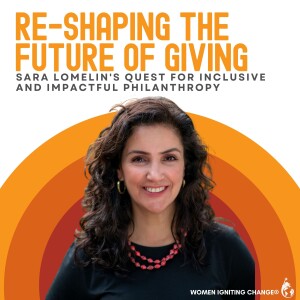
Monday Feb 19, 2024
Monday Feb 19, 2024
“We are reclaiming it. Philanthropy is love of humanity. We all can, and should, be philanthropists.”
Sara Lomelin is determined to democratize and demystify the world of philanthropy and the image of philanthropists as benevolent billionaires who save the day by bestowing their riches on those in need. As the CEO of Philanthropy Together, Sara promotes “giving circles,” whereby a group of people with shared values gather together to create change. Together, they pool not only their financial resources but also their time and their talent.
Collective giving is just as beneficial to the givers as it is to the beneficiaries. They become more engaged, educated and informed. They also experience a sense of community which is a boost to both mental and physical health and needed more than ever in a society in which citizens are suffering increasingly from loneliness and isolation. It also fosters communication among a diverse group of voices in a world that is more divided than ever.
Diversity is something that’s severely lacking in the philanthropic world, Sara explains, with causes related to women of color and the LGBTQIA community getting a combined total of about three percent of all charitable funds. This is only further proof that we can’t wait around for a billionaire to support the causes most important to us and to our communities.
Diversity is not just relegated to gender or sexual orientation, young people are also left out of the philanthropy conversation. Sara gives listeners advice on how they can encourage their children to get involved and why it’s important. She also shares stories of some impressive young people and the changes they are already making in the world.
All of us, at any age, can get involved in philanthropy, and there is no better time than now. The key is to get out of our heads and stop expecting perfection. In giving circles, we all come to the table with something to share and leave with something to learn.
Quotes
“The whole idea of collective giving and of giving circles is to really change the narrative of who gets to be called a philanthropist. You don’t have to be a millionaire, a billionaire, or a 65-year-old white man to be called a philanthropist. You could be in your 20s, you could be living anywhere, and you have the power to really change your community and the reality of those around you.” (2:26 | Sara Lomelin)
“In a giving circle, because of the social aspect of it, because of the community that you build with your giving circle members, you are really being intentional. You are really learning about different causes and different organizations. There is research that people who participate in giving circles and collective giving groups are incredibly well-informed and engaged and educated.” (7:41 | Sara Lomelin)
“Collective giving is an exercise in democracy. These giving circles are min- labs of civic engagement, of dialog, of being in a space where you and I may not see eye to eye in many ways but we can still get together and rally behind a cause that is close to both our hearts.” (15:06 | Sara Lomelin)
“It is infuriating; it should get all of us mad. And in terms of women and girls, when you think of women and girls of color, the percentage of money allotted to them is tiny, tiny. So, that is why, again, we cannot wait for a billionaire to decide that those causes are worthy of getting money. It’s why all of us need to do something about it.” (22:12 | Sara Lomelin)
“And that’s life, life is diverse, and we need diverse voices. And when we think about diversity, it’s not only about race or gender, or sexual orientation, it’s also about age. I feel that a lot of times we leave young voices outside. And this model, for those listening who have children, is the perfect model for young people.” (29:02 | Sara Lomelin)
Links
Connect with Sara Lomelin:
Website: https://philanthropytogether.org/
Resources: https://philanthropytogether.org/programs-resources/resource-library/
TED Talk: https://www.ted.com/talks/sara_lomelin_your_invitation_to_disrupt_philanthropy?language=en
LinkedIn: https://www.linkedin.com/in/saralomelin/
Connect with Robbin Jorgensen (She/Her):
Website: https://womenignitingchange.com
LinkedIn: https://www.linkedin.com/company/women-igniting-change/
LinkedIn: https://www.linkedin.com/in/robbinjorgensen/
Facebook: https://www.facebook.com/robbin.jorgensen/
Podcast production and show notes provided by HiveCast.fm
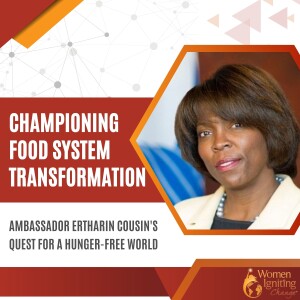
Monday Feb 05, 2024
Monday Feb 05, 2024
“One in eight people or over 41 million Americans lack consistent and reliable access to nutritious and affordable food. One in four people in a food line is a child,” explains Ambassador Ertharin Cousin, CEO and Founder of Food Systems for the Future, who is on a mission to end hunger and malnutrition and to promote food security both in the U.S. and around the world. Ensuring that all people have consistent access to affordable and nutritious food requires the complementary aspects of advocacy, awareness and capital. Food Systems for the Future achieves its investment impact by taking a 360-degree, wraparound approach, addressing the needs of everyone on the food value chain from the consumer, whose demand for supply is crucial, to the farmer, more and more of whom are being pushed off of the land because they can’t afford to farm.
Despite the many environmental issues–particularly greenhouse gases—linked to food production, it is still barely mentioned in the ongoing conversation on climate change until very recently, and only receives 4% of the funding allotted to combat climate issues. Ambassador Cousin discusses her work to support the poultry value chain in Rwanda–where 30 percent of children are chronically malnourished—by working to create a system which is the first of its kind in the Global South. By providing an alternative feed source to the poultry, not only will this system make eggs more affordable but lessen environmental impact, lower production costs and upcycle food waste, creating a fully circular, sustainable, and affordable alternative to traditional methods. It is an example of global investment and tailored local needs, addressing the macro as well as the micro implications.
Having grown up in a family of community-minded changemakers, Ambassador Cousin recognizes the power of citizen involvement to create impact. She explains how businesses and individuals can get involved to help promote food systems transformation, which, contrary to popular belief affects both urban and rural communities.
Quotes:
“We need to recognize that as we work with affected people, we must build awareness of the need for consumption of more diverse nutritious diets, as well as providing the access to the financial resources and the foods for changing those diets.” (9:36 | Ambassador Cousin)
“Communication, credibility, honesty and integrity, and emotional intelligence—everybody is different and the willingness to understand and accept everyone, that everyone brings different perspectives, requires listening and consideration. It is the only way you can lead. If you can do those things, that’s the start of a really good leader.” (13:53 | Ambassador Cousin)
“There are a lot of people out here doing advocacy but the challenge is the change is not occurring just because we’re saying the right things. Unless we can move the capital that is necessary to actually scale the change that is required, it’s just talking.” (18:29 | Ambassador Cousin)
“Too often when we talk about those who lack access to affordable and nutritious food, we talk about urban communities. Yes, there is a problem in urban communities; there is also a problem in rural America. We are seeing main streets close all across rural America. Those same populations–those with limited incomes, lack of access to transportation, the infirm, the elderly, are affected whether they live in rural Iowa or in the urban center of Chicago.” (31:29 | Ambassador Cousin)
“Citizen involvement and engagement is what helps make this country great.” (50:24 | Ambassador Cousin)
Links
Connect with Ambassador Ertharin Cousin:
Website: https://www.fsfinstitute.net/
Ambassador Cousin's Bio: https://www.fsfinstitute.net/ertharin
FSF LinkedIn: https://www.linkedin.com/company/food-systems-for-the-future/
Connect with Robbin Jorgensen (She/Her):
Website: https://womenignitingchange.com
LinkedIn: https://www.linkedin.com/company/women-igniting-change/
LinkedIn: https://www.linkedin.com/in/robbinjorgensen/
Facebook: https://www.facebook.com/robbin.jorgensen/
Podcast production and show notes provided by HiveCast.fm
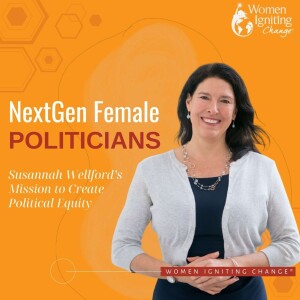
Monday Jan 29, 2024
Monday Jan 29, 2024
“I think a lot of people feel really alone,” says Susannah Wellford, Founder and CEO of Running Start. They have dreams but they have no idea how they can make those dreams happen, so you need to create these groups of people in their corner to support them.” For young women with dreams of running for office and making political impact, Running Start provides the skills and preparation to do so by helping them find their passion, cultivate their sense of leadership and learn to communicate in a way that will inspire change.
Around the world, despite cultural differences and varied lived experiences, women’s desires and challenges remain universal. They have ideas and passions but may not have the platform or the belief that anyone will hear them. With programs in thirty countries across the globe, Running Start teaches participants not only to make their voices heard but to actively listen to those with whom they disagree.
As the U.S. becomes increasingly polarized, and with women’s rights on the line, representation, parity, and women’s voices matter more than ever. In today’s discussion, Susannah and Robbin discuss the need for civil discourse among diverse voices, how female leaders behave differently than their male counterparts and the importance of getting young people engaged in politics.
Quotes
“Wherever I go, whenever I’m speaking to women, the problems are the same. The obstacles are the same. It’s just so fascinating to me. And, of course, it’s true, some of those external factors that keep women out of leadership are very different around the world, but the internal hesitancy toward leadership, or that feeling of, ‘I don’t know if I’m right for this’--because nobody’s ever told them that they’re right for this, they don’t have a lot of role models–you see that all around the world.” (6:15 | Susannah)
“You sometimes need other people to believe in you before you figure out how to believe in yourself. And if you think about the things that create a successful life, resiliency is absolutely one of them, and that’s the path to resiliency. Sometimes you need somebody to say, ‘Robbin, I think you’re really good at this and I think you should do this thing.’ And once you feel solid in your sense of self, you’re sort of unstoppable.” (14:44 | Susannah)
"If we close ourselves off and say I know what I know and I don't want to hear what anybody else knows, you never get smarter, you miss so many things and that leads to all of the walls that we build not just in politics but in society in general." (25:05 | Susannah)
“If there aren’t women who can be catalyzed by even enormous seismic shifts affecting women’s rights, we need to start earlier getting young women to see that politics is a place for them.” (28:08 | Susannah)
Links
Connect with Susannah Wellford:
Website: https://www.runningstart.org/
About Susannah: https://www.runningstart.org/
LinkedIn: https://www.linkedin.com/in/susannah-wellford-405110/
Connect with Robbin Jorgensen (She/Her):
Website: https://womenignitingchange.com
LinkedIn: https://www.linkedin.com/company/women-igniting-change/
LinkedIn: https://www.linkedin.com/in/robbinjorgensen/
Facebook: https://www.facebook.com/robbin.jorgensen/
Podcast production and show notes provided by HiveCast.fm
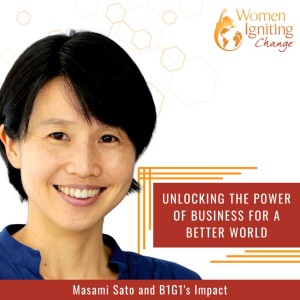
Monday Jan 22, 2024
Monday Jan 22, 2024
“When we are doing something that benefits all, rather than benefits just ourselves,” explains today’s guest Masami Soto, founder and CEO of B1G1,”it unlocks an amazing experience and sense of connection.” B1G1 is a global business giving initiative that allows businesses to provide “giving impacts” to deserving people throughout the world. At the same time, it helps businesses foster a culture that redefines how they think of giving, as a series of small daily acts. Since its founding 16 years ago, B1G1 is responsible for 335 million giving impacts worldwide.
As a young woman, Masami experienced profound generosity and grace from strangers—often those who had the least–who looked out for her as she backpacked across the world. After giving birth to her daughter she realized she wanted to ensure that all children had the same access and opportunities. She soon realized that most businesses are eager to find creative solutions that will make the world better for others. B1G1 helps create a synergy between its network of businesses great and small, so that they can work together to elevate a mission greater than themselves.
The act of giving is, Masami explains, actually a gift we give to ourselves. In this episode she explains how B1G1’s mission has evolved since its inception, what individuals can do to create impact in their own lives, and the many ways companies can do business for good.
Quotes
“I couldn’t make sense of why everybody was working so hard to try to get more, but at the same time our purpose, our endeavor, of getting more didn’t lead to a sense of fulfillment. At the same time, sometimes there were people who had so little but they seemed to be happy and smiling and generous and giving.” (5:09 | Masami)
"The only way we can really transform our future and ensure every child has access to wonderful opportunities in the future is for all of us to take action." (15:27 | Masami)
“If we really think about kindness as doing things for others, it feels like losing something. Giving away means losing something, whether it’s money or time or effort, then it feels like an extra chore. But if we saw that kindness and caring as something that adds to ourselves, it’s a gain.” (18:13 | Masami)
“When everyone comes together to try to do something, that’s bigger than themselves, not just about them but about people they might never meet, about the involvement in ensuring a sustainable future for the next generation.” (22:59 | Masami)
“There is that sense of “doing together.” My company is small but these impacts are impacts I create, but I’m doing this together with many other businesses, which means collectively we can create a much greater impact. We no longer need to be disempowered by being small.” (24:00 | Masami)
Links
Connect with Masami Sato:
Website: https://b1g1.com/
Masami's Bio: https://www.dropbox.com/s/57nyv7io2gd60jn/Masami%20Sato%20Profile.pdf?dl=0
LinkedIn: https://www.linkedin.com/in/masamisato/
Connect with Robbin Jorgensen (She/Her):
Website: https://womenignitingchange.com
LinkedIn: https://www.linkedin.com/company/women-igniting-change/
LinkedIn: https://www.linkedin.com/in/robbinjorgensen/
Facebook: https://www.facebook.com/robbin.jorgensen/
Podcast production and show notes provided by HiveCast.fm
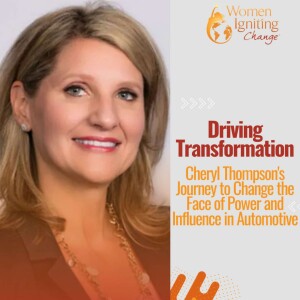
Monday Jan 15, 2024
Monday Jan 15, 2024
“This is an investment in your people,” explains Cheryl Thompson, Founder and CEO of the Center for Automotive Diversity Inclusion and Advancement (CADIA), which works to address the systemic disparities around diversity and inclusion in the automotive industry. Cheryl gained her first insights into how true leaders operated while serving as wait staff at Ford World Headquarters. After rising in the ranks at the company to a position of global leadership, she realized how many talented people were overlooked and underestimated due to lack of inclusive practices within the automotive industry. Through her organization, CADIA, she is working to double the number of diverse leaders within the automotive industry by 2030, and as a member of the CEO Coalition for Change, she works with fellow leaders to bring similar change across a variety of industries.
Diversity Equity and Inclusion (DEI) practices not only benefit the employee, their families and their communities, but employers as well, by accelerating company as well as industry progress. As the population changes and a new generation of workers demand new standards and practices, leaders can’t afford not to infuse an equitable and diverse mindsets into everything from recruitment practices to performance evaluations.
DEI is an ongoing practice and the work is never over. Join today’s discussion to learn about the challenges the automotive industry still faces, the progress that has already been made, and the many invisible aspects of diversity in the workplace that often get overlooked.
Quotes
“When I got to that table, I sat around and thought, ‘Wow. I thought y’all had it all figured out.’ And that was my big ‘aha!’ that I had been underestimated, I had been underestimating myself. That’s when I really started to have more awareness about how things work, and how some people are just overlooked and they just have so much more to contribute.” (4:12 | Cheryl Thompson)
“This is an investment in your people, giving them time to participate in something like this is going to help your productivity through communication and being more effective and efficient, with fewer quality mistakes, and that psychological safety to call out when something isn’t OK.” (24:32 | Cheryl Thompson)
“I’d like to see even more progress in terms of representation overall, and have that carry through to the very senior levels of C-Suite. I’d like to see the same with racial and ethnic minorities, representation increased there. And I’d like to see companies have cultures that are a lot more psychologically safe so that people can self-identify.” (25:22 | Cheryl Thompson)
“A lot of the companies see the demographics changing and this next generation coming into the workplace– boy oh boy, they are not putting up with the stuff you and I tolerated. Leaders want to know how we attract and retain talent and they’re starting to realize if we aren’t more inclusive with our recruiting, we’re going to miss out on 61% of the workforce.” (27:26 | Cheryl Thompson)
Links
Connect with Cheryl Thompson:
Website: https://www.cadia.org/
About Cheryl: https://www.cadia.org/team-members/cheryl-thompson/
LinkedIn: https://www.linkedin.com/in/cheryl-thompson/
Connect with Robbin Jorgensen (She/Her):
Website: https://womenignitingchange.com
LinkedIn: https://www.linkedin.com/company/women-igniting-change/
LinkedIn: https://www.linkedin.com/in/robbinjorgensen/
Facebook: https://www.facebook.com/robbin.jorgensen/
Podcast production and show notes provided by HiveCast.fm
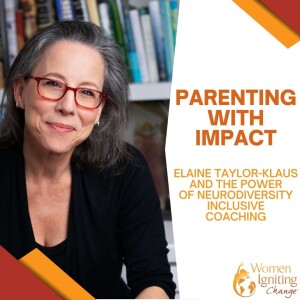
Monday Jan 08, 2024
Monday Jan 08, 2024
“Everybody’s brain is different,” says Elaine Taylor-Klaus, co-founder of Impact Parents and author of “The Essential Guide to Raising Complex Kids,” “And different is not bad.” As a young mother of neurodivergent–or as she likes to call them “neuro-spicy”- kids, she realized there was very little support for parents in a similar situation. This led to co-founding Impact ADHD, which, like Impact Parents, provides neurodiversity inclusive coaching. There, parents learn to meet kids where they are in any challenge, set the expectations from there, and allow kids to meet their potential. Parents “should” on their children too much, thinking they should be able to handle the challenge on their own. Connecting to others with similar experiences reminds parents that they’re not alone.
Elaine’s “coach approach” is effective not only for kids with ADHD, but for a generation facing a slew of unprecedented challenges. Not only have they just come through a global pandemic but they are being bombarded with more information–more quickly–than ever before. What’s more, they are attached to devices that are designed to be dopamine stimulators.
Many educators, doctors, and even high-profile psychiatrists are still woefully ill-informed about neurodiversity in young people. Too many people wait too long to seek help for fear of embarrassment, or hoping the issue will go away. On today’s episode of Women Igniting Change, Elaine will break down many lingering myths about neurodiversity, provide incredible resources for our listeners and what parents can do to advocate for themselves and their communities.
Quotes
“The modality, this approach is every bit as useful for any child, because it’s really about meeting them where they are and helping them play to their strengths and empowering them to take control of their lives. Really, we’re not raising children, we’re onboarding adults.” (6:59 | Elaine)
“Parents have the sense that ‘I should know how to do it because parents have been parenting for eons.’ But parents haven’t been parenting in this environment, in this world, with these expectations, with these stresses and pressures and we need help.” (9:47 | Elaine Taylor-Klaus)
“Our kids are getting bombarded with more information in an hour than many of us got in a month or in our lives growing up. The way that people are exposed to information has changed.” ( 11:42 | Elaine Taylor-Klaus)
“Expectations are “shoulds.” What we really want to do is enroll our kids in setting their own expectations for themselves rather than ‘shoulding’ all over them.” (17:40 | Elaine Taylor Klaus)
“I’m a huge advocate for finding community. I think there’s probably nothing more important that a parent can do.” (22:18| Elaine Taylor-Klaus)
Links
Connect with Elaine Taylor-Klaus:
Website: https://impactparents.com/
Resources: https://impactparents.com/resources/
Free Gift: https://impactparents.com/ignitingchange
About: https://impactparents.com/about-impactparents-our-story/about-impactparents-elaine/
LinkedIn: https://www.linkedin.com/in/elainetaylorklaus
Book: https://www.amazon.com/stores/Elaine-Taylor-Klaus/author/B00AAQ9RN0?ref=ap_rdr&store_ref=ap_rdr&isDramIntegrated=true&shoppingPortalEnabled=true
Connect with Robbin Jorgensen (She/Her):
Website: https://womenignitingchange.com
LinkedIn: https://www.linkedin.com/company/women-igniting-change/
LinkedIn: https://www.linkedin.com/in/robbinjorgensen/
Facebook: https://www.facebook.com/robbin.jorgensen/
Podcast production and show notes provided by HiveCast.fm

Monday Jan 01, 2024
Monday Jan 01, 2024
“Why are we quoting Winston Churchill all the time?” While judging an annual speech contest, Dana Rubin, an award-winning journalist, speech writer and speech coach, noticed that writers were continuously citing speeches from the same handful of famous men. Similarly, speech anthologies barely featured women in their pages, and so she set about seeking out and compiling speeches by women–many of whom had been largely ignored by history. Eventually, she launched the online speech bank,` Speaking While Female. This portal, and the book of the same name, focus on expanding diverse voices and viewpoints in the public discourse.
Despite being vastly underrepresented, there was a wealth of female voices from which Dana chose. Women, particularly indigenous women, were leaders in all sectors of their communities. They spoke out regularly on major political, social and religious issues. Men and women are largely similar in the way they communicate, Dana explains, they are just often relegated to the less visible (and audible) domestic sectors, or aren’t raised with the message that women’s voices matter.
This is changing, however, as more and more women start to speak up. Dana offers women–including young women–tips on how they can begin to make their voices heard across their communities and beyond.
Quotes
“I collected 230 speech anthologies. This is from the United States, Canada, Ireland, South Africa, the Philippines, of course, the United Kingdom, anywhere and everywhere English was spoken and they published speech anthologies. I just started when going through the table of contents with a pencil and counting how many speeches by men and how many by women. And the more I saw, the angrier I got, and the angrier I got, the busier I got.” (5:46 | Dana)
“It is eye-opening. I put them in categories, thematic categories, and you can, starting from the top, look at the category of anti-slavery, and see how many women spoke out about slavery all over the world. And you go down from there: health and medicine, religion and belief, temperance, all kinds of categories.” (7:07 | Dana)
“It's a message that we all imbibe, as we grow up, that it's men's voices that are important, and valued and women's voices are secondary or expendable. We grow up and then we become adults, and we’re reluctant to speak out. We don't think that we have the expertise to share even though we may have a PhD or have written five books, women still don't want to speak in public. We don't stand up nearly in the same proportion as men.” (8:44 | Dana)
“A good speech, a powerful speech takes the audience from one place to another. You begin in one place and you take them to another and by the end, you have asked that audience or compelled, inspired, that audience influenced that audience, to do something different, whether it's vote for legislation–‘Vote for me as a candidate!’–Get behind a cause, donate to a cause, even think about it, even if it's a sermon.” (14:26 | Dana)
“We've seen this movement towards inclusivity, in including more voices, because we recognize that everybody's voice counts, matters, and has an important role to play.” (18:27 | Dana)
“Start small. Speak in your communities, speak in your house of worship, go to toastmasters speak at a rotary club meeting. Just get out there and speak. Because it is a fact undeniable that the more you speak, the better you get.” (21:52 | Dana)
Links
Connect with Dana Rubin:
Website: https://speakingwhilefemale.co/
Website: www.danarubin.com
Dana’s Bio: https://speakingwhilefemale.co/speaking-while-female/
Book: https://speakingwhilefemale.co/book/
Connect with Robbin Jorgensen (She/Her):
Website: https://womenignitingchange.com
LinkedIn: https://www.linkedin.com/company/women-igniting-change/
LinkedIn: https://www.linkedin.com/in/robbinjorgensen/
Facebook: https://www.facebook.com/robbin.jorgensen/
Podcast production and show notes provided by HiveCast.fm
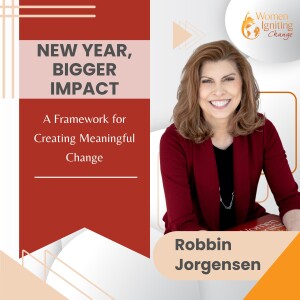
Monday Dec 25, 2023
Monday Dec 25, 2023
As 2024 quickly approaches, you’re probably thinking about your New Year’s Resolutions. But while you’re focused on your own personal goals, Robbin wants to help you think bigger–with The Bigger Game! This 9-square grid is a framework which will allow you to create the social change you want to see in the world. On today’s episode, Robbin will guide you–after all, no one creates change by themselves–through action markers such as “the hunger square,” which is the deep yearning you have inside yourself to make change in the world, your “compelling purpose,” or your “why,” as well as your “gulp square,” which is the part of the process which should inspire what Robbin calls “gleeful terror.”
A major part of taking on this framework is to accept that you won’t know what you’re doing at first. Too often, women especially, stop before they start if they feel like they are not in control of every step of the process. This game is not business as usual, and that’s kind of the point. Follow the steps Robbin has laid out for you and watch change unfold more quickly than you can imagine.
Not everyone will be your cheerleader as you continue along this journey, but as Robbin explains, even naysayers will provide you with value. Take bold action–join today’s episode of Women Igniting Change and take the first step toward becoming the leader and social changemaker that you want to be!
Quotes
“You have a deep desire to create meaningful change. It's so much bigger than you, that you know you're meant to put out there.” (5:46 | Robbin)
“When we were all little girls, if you equate a dial on a scale of 1 to 10, 1 is low 10 is off the charts, when we were little, our hunger dial literally was 11. We knew we could be anything we wanted to be, do anything we wanted to do. But here's what happens: As we become grown adults, we tend to take that hunger dial, and we turn it down to a dull simmer, and that's how we live our lives.” (6:00 | Robbin)
“Give yourself permission to dream and imagine that deep desire for social change that you want to put out there.” (7:00 | Robbin)
“Allies can be your biggest champions, your biggest cheerleaders, they’ve got your back in this bigger game that you want to put out into the world. Those are your cheerleaders. Allies can also be people that say to you that is the dumbest idea I've ever heard, you can't possibly do that, what are you thinking? Those are allies, too.” (11:01 | Robbin)
“Especially as women, what we tend to do, if we take a step forward, and it goes a little sideways, we're automatically beating ourselves up that we did something wrong, or we should have done something different.” (13:02 | Robbin)
Links
Connect with Robbin Jorgensen (She/Her):
Bigger Game Board: https://drive.google.com/file/d/1ugo8-rYhN4CjoANWShujtRyOB9UxIXPs/view
Website: https://womenignitingchange.com
LinkedIn: https://www.linkedin.com/company/women-igniting-change/
LinkedIn: https://www.linkedin.com/in/robbinjorgensen/
Facebook: https://www.facebook.com/robbin.jorgensen/
Podcast production and show notes provided by HiveCast.fm

Women Igniting Change®
Founder and CEO of Women Igniting Change®, is your host. A former corporate executive, passionate human and women's rights activist, and global speaker, who has worked with women leaders in 14 countries on 6 continents believes that unleashing the contribution of women is one of the key drivers to moving business and humanity forward.


